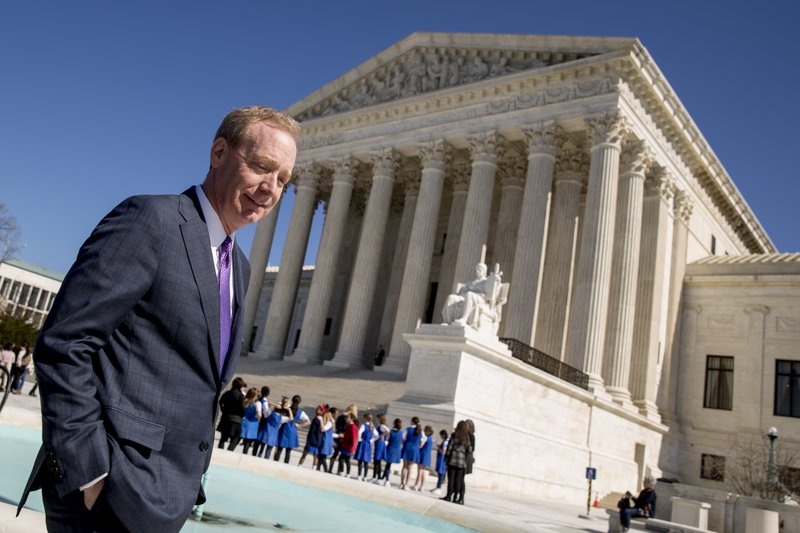WASHINGTON -- The Supreme Court on Tuesday explored what happens when a decades-old law meets 21st-century technology.
The justices heard arguments in a dispute between the Trump administration and Microsoft Corp. over a warrant for emails stored in the Internet cloud outside the United States.
The Drug Enforcement Administration wanted the emails as part of a drug trafficking investigation. The agency obtained a warrant under a 1986 law, but Microsoft refused to turn over the emails because they are stored on a company server in Dublin, Ireland, and the warrant does not apply abroad.
The federal appeals court in New York agreed with the company that the 1986 Stored Communications Act does not apply outside the United States.
The arguments highlighted the difficulty that judges face in trying to apply older laws to new technological developments.
"I recognize we have a difficult statute here," Justice Anthony Kennedy said.
When the law was written, Justice Ruth Bader Ginsburg said, "No one ever heard of clouds. This kind of storage didn't exist."
The administration has argued that investigations have been hampered by the appellate ruling. Justice Department lawyer Michael Dreeben said that the focus should be on Microsoft's headquarters in Redmond, Wash. That's where a computer operator would retrieve the emails and hand them over to federal authorities.
Joshua Rosenkranz, representing Microsoft, wanted to talk about where the emails are kept.
"They are stored in Ireland. And the government is asking us to go and fetch them from Ireland," Rosenkranz said.
Chief Justice John Roberts said the government seemed to have the better of the argument because "the statute focuses on disclosure. And disclosure takes place in Washington, not in Ireland."
Rosenkranz told the justices that a ruling could damage the standing of the United States as the world leader in the multibillion-dollar cloud computing business.
"If you try to tinker with this without the tools that -- that only Congress has, you are as likely to break the cloud as you are to fix it," he said.
Ginsburg and other justices said it would be better if Congress updated the law. Sen. Orrin Hatch, R-Utah, who was in the courtroom Tuesday, is a sponsor of a bipartisan proposal that has been introduced in Congress.
The legislation known as the Cloud Act has the support of the Trump administration and Microsoft.
But lawyers on both sides said the court should decide the case before it, not wait for Congress to act.
Roberts suggested Microsoft's argument would put out of the government's reach an email sent from the Supreme Court building to someone just a block away, if the company had chosen to store it on a server outside the United States.
Nothing would keep Microsoft "from storing United States communications, every one of them, either in Canada or Mexico or anywhere else, and then telling their customers: Don't worry if the government wants to get access to your communications; they won't be able to," without getting help from a foreign government, Roberts told Rosenkranz.
Dreeben told the court that Microsoft voluntarily moved the emails to a server in Ireland and could just as easily retrieve them. He stressed that the government had a warrant, "the gold standard" for addressing privacy concerns.
"It's not a case about privacy," said Dreeben, who is part of special counsel Robert Mueller's Russia investigation team, but has occasionally argued important cases at the Supreme Court.
Rosenkranz described how much physically has to happen in Ireland when someone at Microsoft headquarters issues a command to retrieve emails from the Dublin server. Even after the emails are found, the data "runs through Ireland on hard wires and then over the Atlantic," Rosenkranz said.
"Does some person have to be there?" Kennedy asked.
No, a robot handles the work in Ireland.
Justice Sonia Sotomayor jumped in. "I guess my imagination is running wild," Sotomayor said to laughter. "Who tells the robot what to do?"
Addressing reporters in front of the court after the arguments, Microsoft President Brad Smith said the arguments reinforced his view that Congress should act.
"Because, in fact, I think that what this case makes clear, and what this morning has further made clear, is that we need 21st-century laws to protect 21st-century technology," Smith said.
Information for this article was contributed by Mark Sherman of The Associated Press and by Bob Van Voris of Bloomberg News.
Business on 02/28/2018
